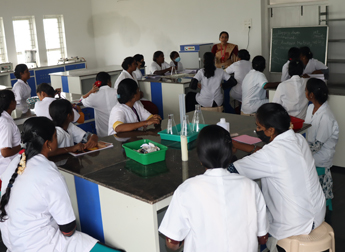Courses





The Department of Microbiology at Auxilium Arts and Science College for Women is dedicated to understanding microorganisms and their role in various fields, including health, agriculture, and the environment. The department provides a strong foundation in microbiological principles and practical applications, preparing students for careers in research, healthcare, biotechnology, and other industries. With modern laboratories and experienced faculty, students gain hands-on experience and a deep understanding of microbial sciences.


The Bachelor of Science in Microbiology (B.Sc. Microbiology) is a three-year undergraduate program focused on the study of microorganisms such as bacteria, viruses, fungi, and protozoa. The course explores their structure, function, and impact on humans, animals, plants, and the environment.
The program aims to:
- Provide an in-depth understanding of microbial diversity, physiology, and genetics.
- Equip students with practical skills in microbiological techniques and research.
- Explore the applications of microbiology in medicine, industry, and environmental science.
- Prepare students for advanced studies or professional roles in psychology.
Curriculum Overview
The B.Sc. Microbiology program spans three years and includes the following components:
Core Subjects
- General Microbiology
- Microbial Genetics and Molecular Biology
- Medical Microbiology
- Environmental Microbiology
- Industrial Microbiology
- Immunology
Elective Subjects
- Agricultural Microbiology
- Food Microbiology
- Virology
- Bioinformatics
Skill-Based Courses
- Techniques in Microbiology (Microscopy, Sterilization, and Culturing)
- Biochemical and Molecular Techniques
- Quality Control in Microbiology
- Microbial Biotechnology
Pratical learning
- Laboratory sessions focusing on microbial isolation, identification, and analysis.
- Internship opportunities in research labs, hospitals, or biotech firms.
- A research project in the final year on a specific microbiological topic or application.
Graduates of B.Sc. Microbiology have diverse career opportunities in healthcare, research, industry, and environmental management, including:
Healthcare and Diagnostics
- Microbiologist in clinical laboratories, hospitals, or diagnostic centers.
- Infection Control Specialist or Medical Lab Technician.
Research and Development
- Research Associate in universities, research institutions, or pharmaceutical companies.
- Microbial Geneticist or Molecular Biologist.
Industrial Microbiology
- Quality Control Analyst in food and beverage industries.
- Fermentation Specialist in pharmaceutical or bio-product industries.
Environmental Microbiology
- Environmental Scientist focusing on pollution control and waste management.
- Microbiologist in water treatment and bioremediation projects.
Agricultural Microbiology
- Soil Microbiologist or Plant Pathologist in agricultural research.
- Consultant for biofertilizer or biopesticide development.
Biotechnology and Bioinformatics
- Specialist in microbial biotechnology applications such as vaccine development.
- Bioinformatics Analyst for microbial genome studies.
Higher Education and Research
- Pursue advanced degrees like M.Sc., M.Phil., or Ph.D. in Microbiology.
- Academic roles as lecturers or professors in microbiology departments.
Government and Public Sector
- Roles in health departments, agriculture ministries, or environmental agencies.
- Positions in public sector research organizations like CSIR, ICMR, or DRDO.
The B.Sc. Microbiology program prepares students for impactful careers by equipping them with both theoretical knowledge and practical expertise in microbial sciences. Graduates are well-positioned to address global challenges in healthcare, industry, and environmental sustainability, making meaningful contributions to society.
